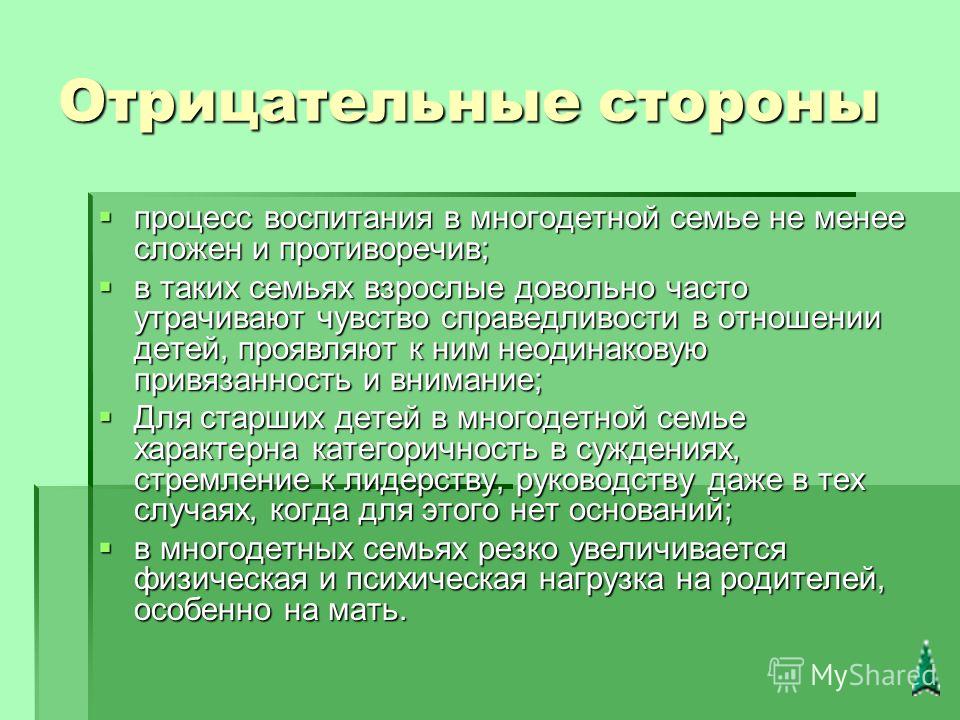Contents Types of intra-family relations Types of intra-family relations Types of intra-family relations Types of intra-family relations Upbringing in single-parent families Upbringing in single-parent families Upbringing in single-parent families Upbringing in single-parent families The only child in the family The only child in the family The only child in the family The only child in the family The upbringing in a large family Upbringing in a large family Upbringing in a large family Upbringing in a large family


Diktat Manifested in the systematic suppression by parents of initiative and self-esteem in children. It manifests itself in the systematic suppression by parents of initiative and self-esteem in children. There is a breakdown of many personality traits: independence, self-esteem.
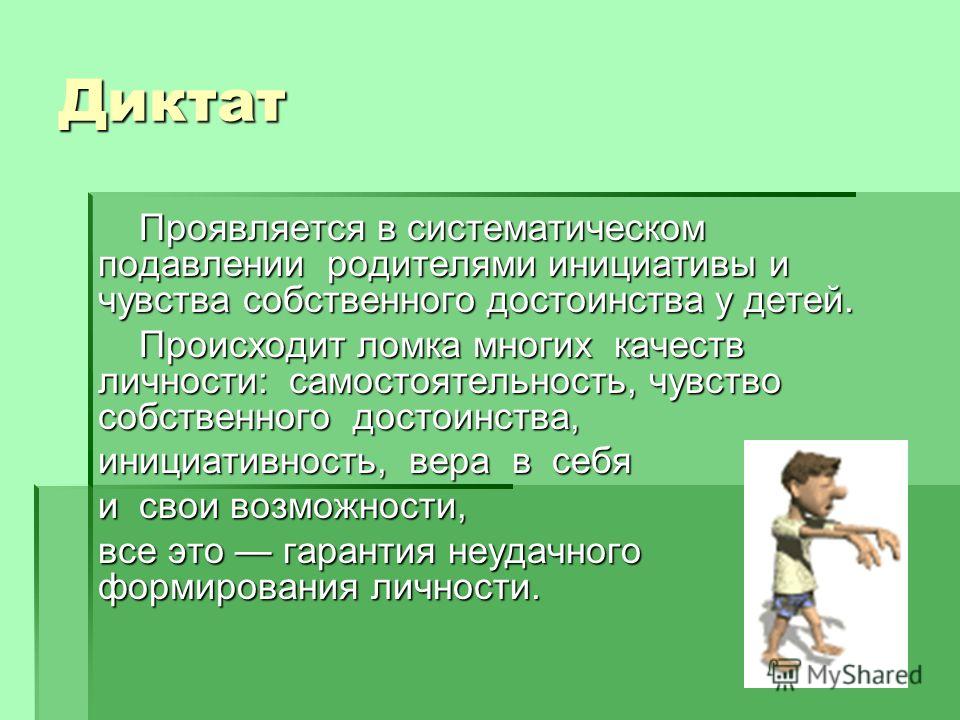
Guardianship in the family A system of relations in which parents, by ensuring the satisfaction of all the needs of the child by their work, protect him from any worries, efforts and difficulties, taking them upon themselves. Excessive concern for a child, excessive control over his entire life, based on close emotional contact, is called hyperprotection.
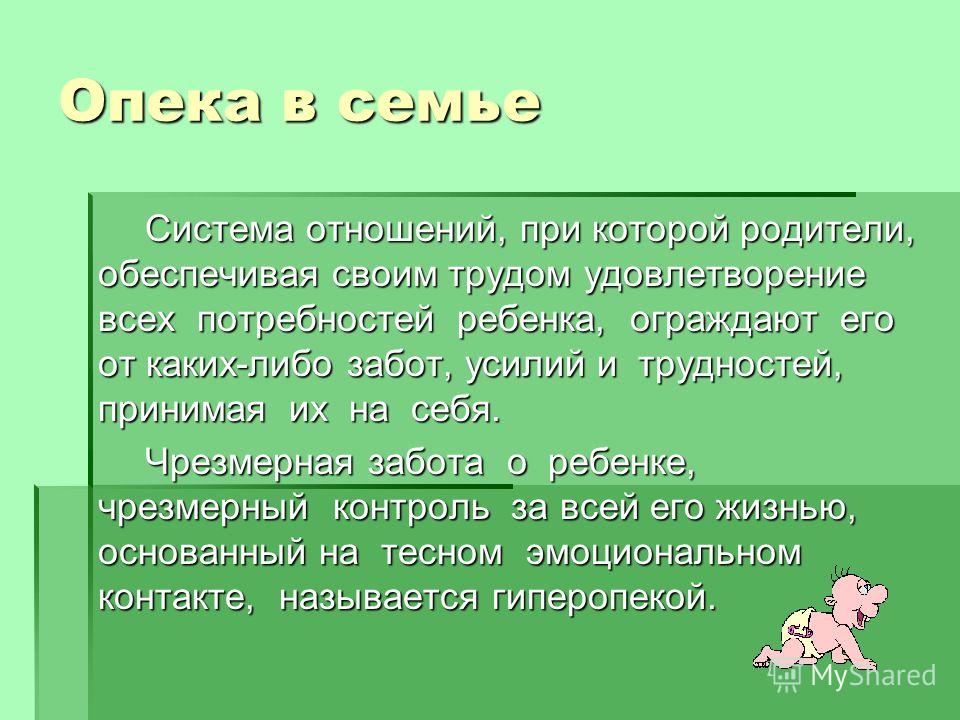
Cooperation Assumes the mediation of interpersonal relations in the family by common goals and objectives of joint activity, its organization and high moral values. It is in this situation that the egoistic individualism of the child is overcome.

Authoritarian style The desire of the parent is the law for the child. Such parents suppress their children. They demand unquestioning obedience from the teenager and do not consider it necessary to explain to him the reasons for their instructions. The desire of a parent is the law for a child. Such parents suppress their children. They demand unquestioning obedience from the teenager and do not consider it necessary to explain to him the reasons for their instructions and prohibitions.
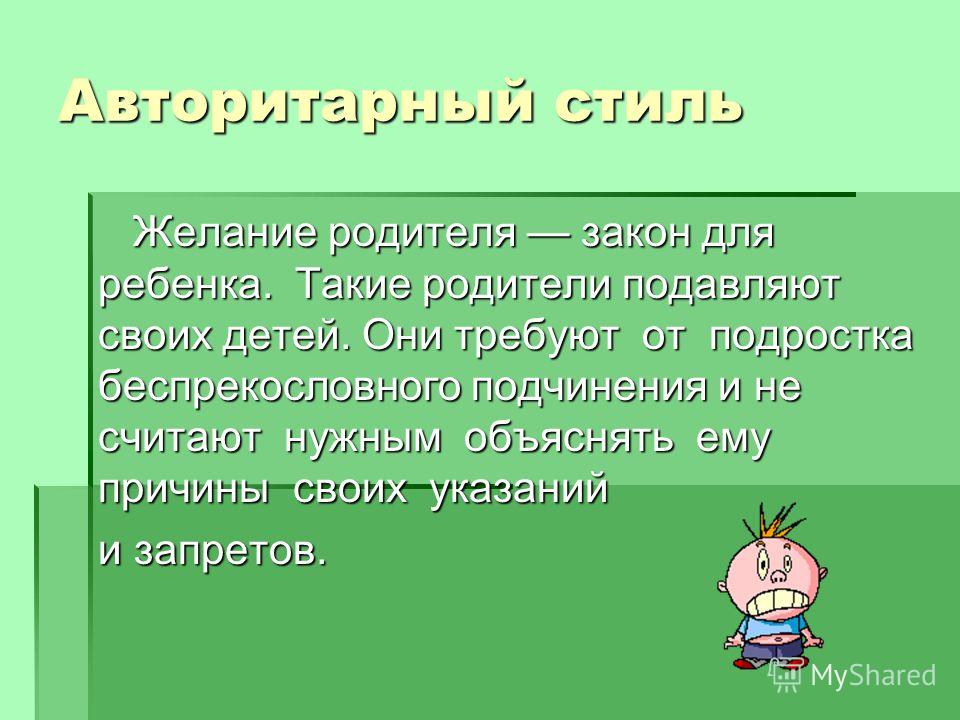
Democratic style Is the most optimal for education. Democratic parents value both independence and discipline in the behavior of a teenager. They themselves grant him the right to be independent in some areas of his life; without prejudice to rights, at the same time demand the fulfillment of duties; It is the best for education. Democratic parents value both independence and discipline in the behavior of a teenager. They themselves grant him the right to be independent in some areas of his life; without prejudice to rights, at the same time demand the fulfillment of duties; they respect his opinion and consult with him.
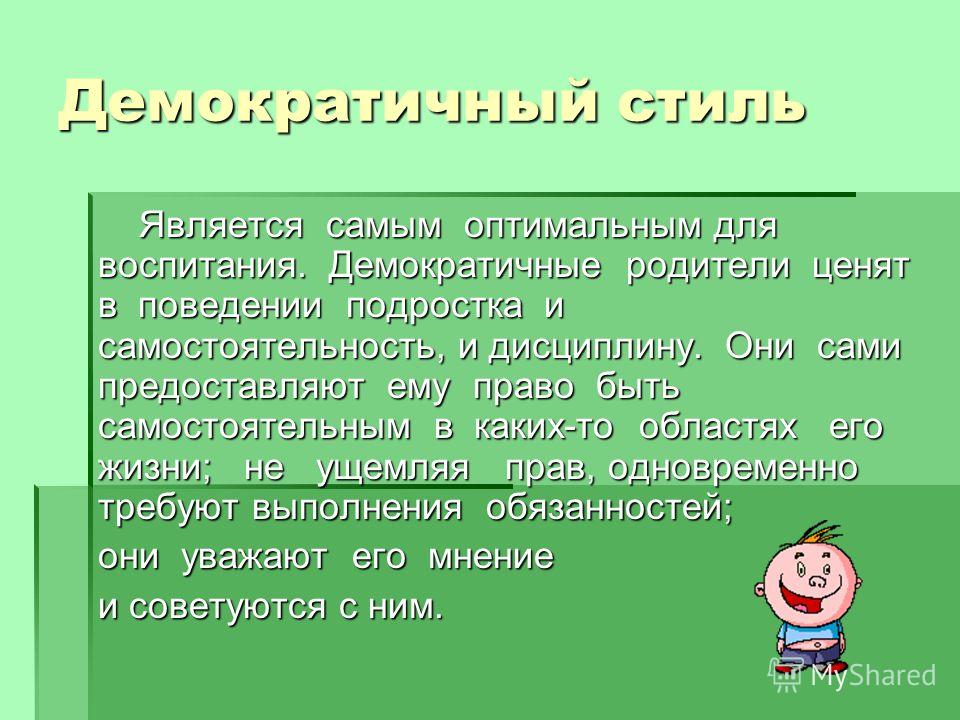
Permissive style Parents almost do not pay attention to their children, do not restrict them in anything, do not prohibit anything. Adolescents from such families often fall under bad influence, they can raise a hand against their parents. Parents almost do not pay attention to their children, do not restrict them in anything, do not prohibit anything. Teenagers from such families often fall under bad influence, they can raise a hand against their parents, they have almost no values.
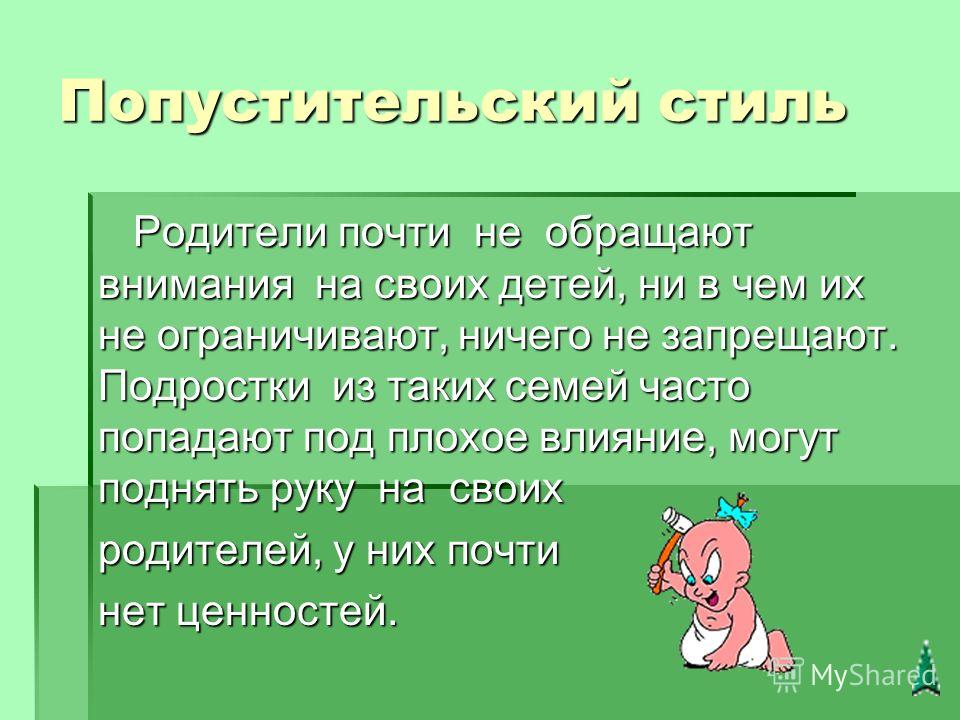

An incomplete family is the most problematic and vulnerable in terms of education. Its proportion among other families is quite high. On the basis of statistical data, it can be stated that the majority of offenders come from single-parent families. In addition, the single-parent family atmosphere makes children more likely to be exposed to alcohol and abuse it. An incomplete family is the most problematic and vulnerable in terms of education. Its proportion among other families is quite high. On the basis of statistical data, it can be stated that the majority of offenders come from single-parent families. In addition, the single-parent family atmosphere makes children more likely to be exposed to alcohol and abuse it.

According to R. Tamotiunienė, the structure of the family influences the formation of value orientations and work attitudes of children. ... Workers who come from incomplete families are dominated by an orientation towards work as an opportunity to become independent, self-sufficient. According to R. Tamotiunienė, the structure of the family influences the formation of value orientations and work attitudes of children. ... Workers who come from incomplete families are dominated by an orientation towards work as an opportunity to become independent, self-sufficient.
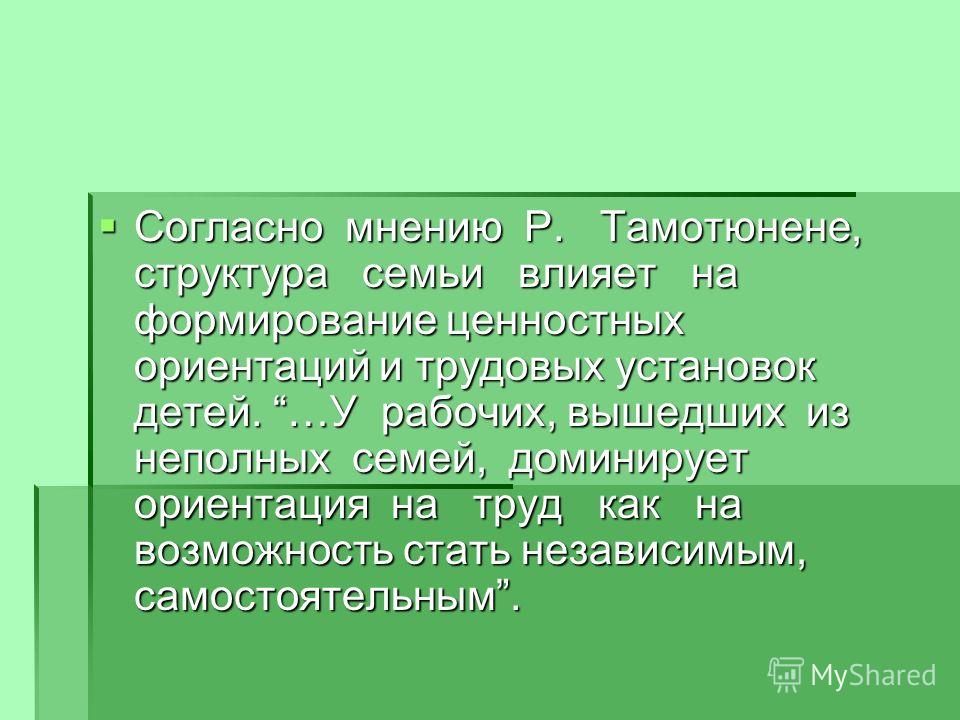
There is evidence that people from single-parent families have a less pronounced or negative experience of preparing for family life, so the likelihood of a marriage breakdown in single-parent families is much higher compared to those who were brought up in ordinary families. There is evidence that people from single-parent families have a less pronounced or negative experience of preparing for family life, so the likelihood of a marriage breakdown in single-parent families is much higher compared to those who were brought up in ordinary families.

The main factor determining the educational inferiority of an incomplete family is moral and psychological. In an incomplete family, the relationship between mothers and adolescent children is much more likely to be limited. Children are usually equally dear to both parents, they feel the need for love for them and equally need it from their side. The main factor determining the educational inferiority of an incomplete family is moral and psychological. In an incomplete family, the relationship between mothers and adolescent children is much more likely to be limited. Children are usually equally dear to both parents, they feel the need for love for them and equally need it from their side.


Only children from birth develop in a special atmosphere. Surrounded for a long time only by adults, they get a more limited personal experience compared to children who have brothers and sisters. Only children from birth develop in a special atmosphere. Surrounded for a long time only by adults, they get a more limited personal experience compared to children who have brothers and sisters. “Being an only child is already having a disease in oneself ...” “Being an only child is already having a disease in oneself ...” S. Hall. S. Hall.

Only children tend to get too much help, and over time, the baby begins to comprehend himself as constantly in need of help. Only children tend to get too much help, and over time, the baby begins to comprehend himself as constantly in need of help.
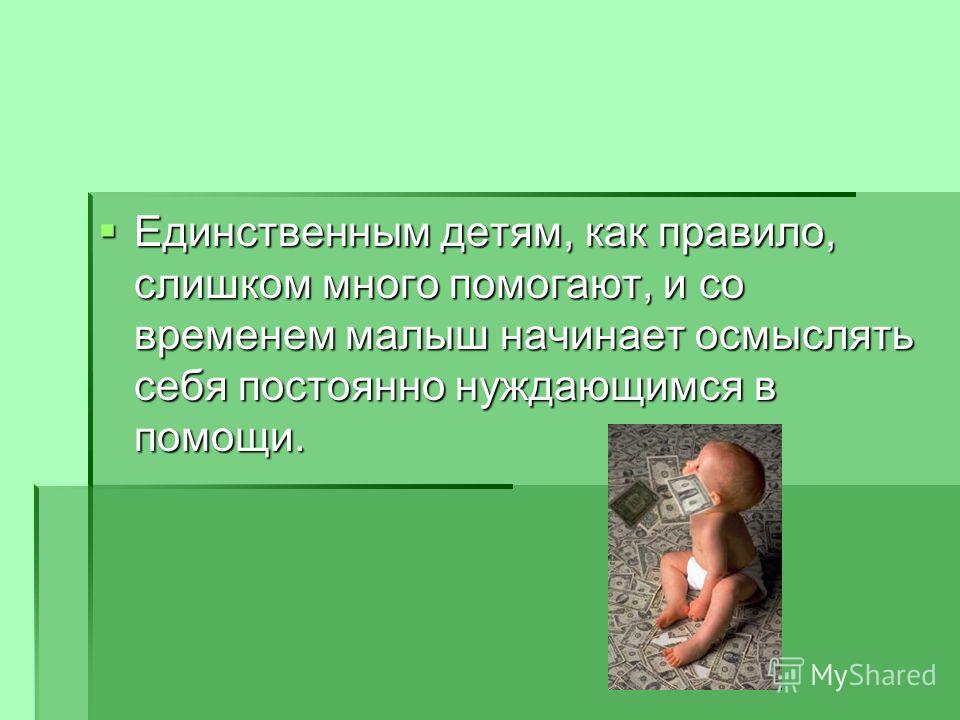


Such children do not have the opportunity to communicate closely with other children of their age (brothers, sisters), which most often leads to incorrect self-esteem. Such children do not have the opportunity to communicate closely with other children of their age (brothers, sisters), which most often leads to incorrect self-esteem. It is more difficult for single children to communicate with peers. Firstly, they do not have the experience of how to adapt to the needs of other children, do not take into account their interests. It is more difficult for single children to communicate with peers. Firstly, they do not have the experience of how to adapt to the needs of other children, do not take into account their interests. An only child often differs from the rest in vocabulary. There are many terms in his speech that are not clear to himself and the surrounding children, adult expressions, it is not easy for him to understand children's jokes. An only child often differs from the rest in vocabulary. There are many terms in his speech that are not clear to himself and the surrounding children, adult expressions, it is not easy for him to understand children's jokes.

The need to have a constant companion in games, a friend in the family with whom one could communicate on an equal footing, is also reflected in their family drawings. They very often include cousins in the family or complement the family with different living creatures: cats, dogs, birds, etc.
 The educational potential of a large family has its positive and negative characteristics, and the process of socialization of children has its own difficulties and problems. The educational potential of a large family has its positive and negative characteristics, and the process of socialization of children has its own difficulties and problems.
The educational potential of a large family has its positive and negative characteristics, and the process of socialization of children has its own difficulties and problems. The educational potential of a large family has its positive and negative characteristics, and the process of socialization of children has its own difficulties and problems.

On the positive side here, as a rule, reasonable needs and the ability to consider the needs of others are brought up; here, as a rule, reasonable needs and the ability to consider the needs of others are brought up; none of the children has a privileged position, which means that there is no ground for the formation of selfishness, antisocial traits; none of the children has a privileged position, which means that there is no ground for the formation of selfishness, antisocial traits; more opportunities for communication, care for the younger ones, assimilation of moral and social norms and rules of the hostel; more opportunities for communication, care for the younger ones, assimilation of moral and social norms and rules of the hostel; such moral qualities as sensitivity, humanity, responsibility, respect for people, as well as the qualities of social order - the ability to communicate, adapt, tolerance can be more successfully formed. such moral qualities as sensitivity, humanity, responsibility, respect for people, as well as the qualities of social order - the ability to communicate, adapt, tolerance can be more successfully formed. children from such families turn out to be more prepared for married life, they more easily overcome role conflicts associated with excessive demands of one of the spouses on the other and low demands on themselves. children from such families turn out to be more prepared for married life, they more easily overcome role conflicts associated with excessive demands of one of the spouses on the other and low demands on themselves.

Negative aspects The process of education in a large family is no less complex and contradictory; the process of education in a large family is no less complex and contradictory; in such families, adults quite often lose their sense of justice in relation to children, show unequal affection and attention to them; in such families, adults quite often lose their sense of justice in relation to children, show unequal affection and attention to them; For older children in a large family, categorical judgments, the desire for leadership, leadership, even in cases where there are no grounds for this, are characteristic; For older children in a large family, categorical judgments, the desire for leadership, leadership, even in cases where there are no grounds for this, are characteristic; in large families, the physical and mental burden on parents, especially on the mother, increases sharply. in large families, the physical and mental burden on parents, especially on the mother, increases sharply.
